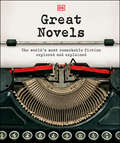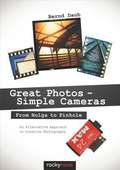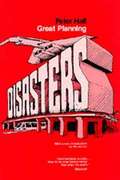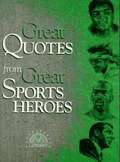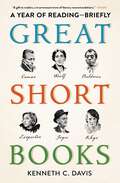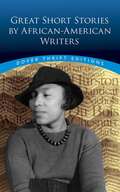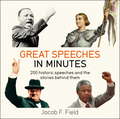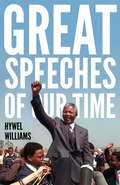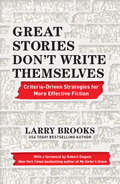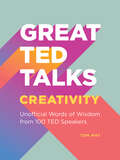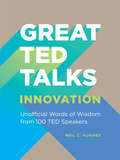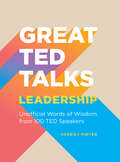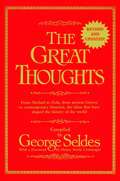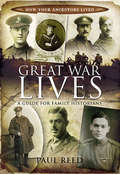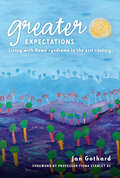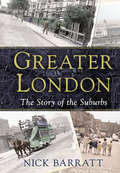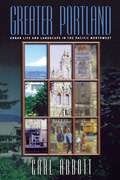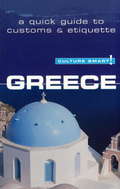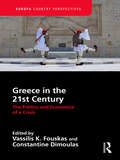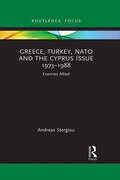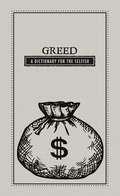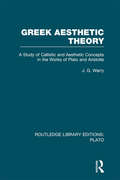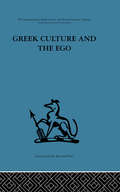- Table View
- List View
Great Novels: The World's Most Remarkable Fiction Explored and Explained (Dk History Changers Ser.)
by DKDiscover everything you ever wanted to know about the world's greatest novels.From medieval romances and tales of chivalry found in the realist novels of the 19th century, to experimental modernist works and today's explorations of the self, Great Novels explores the finest novels from around the world and through time.Tilt at windmills with Don Quixote, experience heartbreak with Tolstoy, discover the society in which Jane Austen lived, and delve into the complex rites of passage experienced by characters in modern novels. Find out what inspired writers to create their masterpieces, what their aims were, and how they set about writing them.Dive deep into the pages of this inspiring book to discover:- Paintings, photographs, and artefacts that tell the story of each novel and what inspired their authors- Superb images of first editions and manuscripts- The flavor of each novel through quotations and extended extracts - "Character maps" showing how characters relate to each other Covering the whole range of literary styles, Great Novels takes you into the pages of the world's seminal novels, ranging from the entertaining adventures of Cervantes' errant knight through to classics such as Great Expectations and Madame Bovary, to modern novels such as To the Lighthouse, The Outsider, Beloved, and Wolf Hall.Stunning images of the original manuscripts, first editions, and authors are complemented by extracts and quotations, while illustrated features set the novels in their literary and historical context. Essential for people of all ages who love books, Great Novels provides a fascinating overview of how the novel has developed through the ages and celebrates the perennial pleasures of reading.
Great Photos - Simple Cameras
by Bernd DaubWhen we look at everyday life, we realize that it is far from easy. Indeed, we are often confronted with the contrary: complicated instead of simple; demanding instead of effortless. As photographers, we face a similar situation with regard to our chosen hobby. The camera and computer are wonderful technical instruments, but their growing complexity can sometimes take away from the joy we find when we engage in creative work. In this book, author Bernd Daub shows us that simplicity works. He describes how with simple camera techniques, traditional film, and some imagination we can create ambitious artwork. This book teaches us how to focus our attention on the motivation behind our chosen image and develop a strong image impact without the need for high-tech equipment and flawless exposures. Learn about a variety of reasonably priced, low-tech cameras-such as the Holga, Diana, and Blackbird-as well as single-use cameras, the good old Agfa-Box, and the pinhole camera. For price-conscious beginners and intermediate photographers with high-quality equipment, this book provides ideas for alternative techniques without large investments. You'll discover many new possibilities as you foster your creativity.
Great Planning Disasters
by Peter HallRecounts the histories of five great planning disasters and two near-disasters and analyzes the decisions of the professional bureaucrats, community activists, and politicians involved in the planning process.
Great Quotes from Great Sports Heroes
by Peggy AndersonQuotes from some of America's greatest sports personalities; witty and insightful thoughts about life, from health and marriage to politics and retirement.
Great Short Books: A Year of Reading—Briefly (Great Short Books)
by Kenneth C. DavisThis entertaining guide to some of the best short novels of all time, from a bestselling historian, is the &“perfect gift for busy bibliophiles&” (BookPage).Experience the joys of literature with this this &“exciting guide to all that the world of fiction has to offer&” (The New York Times Book Review): a compulsively readable, deeply engaging discussion of great short novels. A journey into fiction designed with our contemporary attention spans in mind, Great Short Books suggests fifty-eight excellent short novels, all under 200 pages—easily readable in a week or less—a fresh approach to a fun, fascinating year of reading. From hard-boiled fiction to magical realism, the 18th century to the present day, Great Short Books spans genres, cultures, countries, and time to present an enchanting and diverse selection of acclaimed and canonical novels. From works in translation like Yu Miri&’s Tokyo Ueno Station and Marguerite Duras&’s The Lover to popular, acclaimed authors like Toni Morrison and James Baldwin, this compilation is a celebration of classics from the historic to contemporary—plus a few bestsellers, including Stephen King and Colson Whitehead. Each entry includes the novel&’s opening lines, a spoiler-free plot summary, a &“why you should read it&” section, and suggestions for what to read next. &“An entertaining journey with a fun, knowledgeable guide&” (Booklist), this eclectic collection is a fun and practical book for any passionate reader hoping to broaden their literary IQ—or anyone who wants to find an effortless reentry into reading.
Great Short Stories by African-American Writers (Dover Thrift Editions)
by Bob Blaisdell Christine Rudisel<p>Offering diverse perspectives on the black experience, this anthology of short fiction spotlights works by influential African-American authors. Nearly 30 outstanding stories include tales by W. E. B. Du Bois, Zora Neale Hurston, Claude McKay, and Jamaica Kincaid. <p>From the turn of the twentieth century come Alice Ruth Moore's "A Carnival Jangle," Charles W. Chesnutt's "Uncle Wellington’s Wives," and Paul Laurence Dunbar's "The Scapegoat." Other stories include "Becky" by Jean Toomer; "Afternoon" by Ralph Ellison; Langston Hughes's "Feet Live Their Own Life"; and "Jesus Christ in Texas" by W. E. B. Du Bois. Samples of more recent fiction include tales by Jervey Tervalon, Alice Walker, and Edwidge Danticat. Ideal for browsing, this collection is also suitable for courses in African-American studies and American literature.</p>
Great Speeches in Minutes (In Minutes Ser.)
by Jacob F. Field'I have a dream', 'Government of the people, by the people, for the people', 'This was their finest hour', 'Tear down this wall', 'Give me liberty, or give me death', 'Free at last!'. They are the great words of history, inspiring war and peace, outrage and justice, rebellion and freedom.Great Speeches in Minutes presents the key extracts of 200 of the orations that changed the world, from antiquity to the modern day. Each is accompanied by an explanation of the historic context of the speech and its momentous consequences. Includes the speeches of: Buddha, Socrates, Alexander the Great, Cicero, Julius Caesar, Jesus, Augustine of Hippo, Muhammad, Joan of Arc, Martin Luther, Elizabeth I, Oliver Cromwell, George Washington, Thomas Jefferson, Napoleon Bonaparte, Simon Bolivar, Elizabeth Cady Stanton, Abraham Lincoln, Emmeline Pankhurst, Patrick Pearse, Vladimir Lenin, David Lloyd George, Albert Einstein, Mahatma Gandhi, Franklin D Roosevelt, Adolf Hitler, Winston Churchill, John F. Kennedy, Martin Luther King, Malcolm X, Nelson Mandela, Lyndon B Johnson, Muhammad Ali, Mother Teresa, Margaret Thatcher, Mikhail Gorbachev, Václav Havel, Pope John Paul II, George W. Bush, Barack Obama, and many more.
Great Speeches of Our Time: Speeches that Shaped the Modern World
by Hywel Williams'Let each know that for each the body, the mind and the soul have been freed to fulfil themselves.' These powerful words, spoken by Nelson Mandela in his inaugural address as the new president of South Africa, are taken from just one of the forty important and thought-provoking speeches in this collection. Ranging from 1945 to the present day, they provide an important insight into the modern world. Inspirational speeches by Winston Churchill, Mikhail Gorbachev, Martin Luther King, Barack Obama and many others are supplemented with biographies of each speaker, as well an exploration of their words' significance and an historical account of the consequences of their oratory. This is a history of the recent and contemporary world told through the speeches that shaped it.
Great Speeches of Our Time: Speeches that Shaped the Modern World
by Hywel Williams'Let each know that for each the body, the mind and the soul have been freed to fulfil themselves.' These powerful words, spoken by Nelson Mandela in his inaugural address as the new president of South Africa, are taken from just one of the forty important and thought-provoking speeches in this collection. Ranging from 1945 to the present day, they provide an important insight into the modern world. Inspirational speeches by Winston Churchill, Mikhail Gorbachev, Martin Luther King, Barack Obama and many others are supplemented with biographies of each speaker, as well an exploration of their words' significance and an historical account of the consequences of their oratory. This is a history of the recent and contemporary world told through the speeches that shaped it.
Great Stories Don't Write Themselves: Criteria-driven Strategies For More Effective Fiction
by Larry BrooksStory is the exploration of something that has gone wrong and a lot has to go right during the telling of that story to render it a success. Yet one of the most common questions new writers ask professional writers is about how the author wrote their book, what was their process for storytelling (and from this we get plotters and pantsers)? But really the question should be about the general principles and nature of story--does every part of a story have what it needs to keep readers turning the pages (regardless of how the author got there)? Does every scene, every part of the story support the strategic narrative objective of providing new information a scene will inject in the story (the key principle of writing fiction)? In Great Stories Don't Write Themselves, Larry Brooks has developed a series of detailed checklists backed by tutorial content for novelists of every level and genre to refer to as they write regardless of which writing method they prefer. Beginning with the broadest part of story, the early checklists help writers to ensure that their book is based on a premise (aka plot) rather than an idea, or how you can elevate your idea into an actual premise where other story elements can be developed. Great Stories Don't Write Themselves gradually hones in on other story elements like hero empathy, dramatic tension, thematic richness, vicariousness of story, narrative strategy, scene construction, etc. each with their own checklists with specific, actionable items that ensure that key principle (providing information to move the story forward) occurs.
Great TED Talks Creativity: An Unofficial Guide with Words of Wisdom from 100 TED Speakers (Great TED Talks)
by Tom MayInsights and advice on the creative process from 100 prominent TED Conference speakers. Online TED Talks have provided inspiration to a worldwide audience since 2006, focusing not only on subjects of technology, entertainment, and design but also on cultural, social, and political issues. Great TED Talks: Creativity gathers the ideas presented by 100 speakers and condenses them into a nutshell of practical advice for boosting your own creativity. Also included are URLs directing readers to the TED website so they can watch the original videos in their entirety.
Great TED Talks Innovation: An Unofficial Guide with Words of Wisdom from 100 TED Speakers (Great TED Talks)
by Neil C. HughesBecome more innovative by applying the ideas of 100 prominent TED Conference speakers to your own life.Great TED Talks: Innovation features words of wisdom from 100 speakers and condenses their ideas into accessible advice for becoming more innovative in how you approach and organize your life. Since 2006, online TED Talks have provided inspiration to a worldwide audience. Besides subjects like technology, entertainment, and design, TED Talks also focus on cultural, social, and political issues. Included in each section are URLs directing readers to the TED website so they can watch the original videos in their entirety.
Great TED Talks Leadership: An Unofficial Guide with Words of Wisdom from 100 TED Speakers (Great TED Talks)
by Harriet MinterThe words of 100 prominent TED Conference speakers will help you achieve your personal and professional goals. In 2006, TED Talks became accessible online, and have since been viewed more than a billion times by people across the world. Great TED Talks: Leadership highlights the words of 100 TED Conference speakers and discusses how their ideas can be applied to your own life. Whether you’re a leader of a business group or the organizer of a small social club, the advice in this book will help you visualize and achieve your goals. Included in each section are URLs directing readers to the TED website so they can watch the original videos in their entirety.
Great Thoughts, Revised and Updated: From Abelard to Zola, from Ancient Greece to Contemporary America, the Ideas That Have Shaped the History of the World
by George SeldesUpon its publication, George Seldes's The Great Thoughts instantly took its place as a classic--a treasure house of the seminal ideas that have shaped the intellectual history of the world down through the ages. Seldes, a pivotal figure in the history of American journalism and a tireless researcher, spent the better part of his extraordinary lifetime compiling the thoughts that rule the world, casting his net widely and wisely through the essential works of philosophy, poetry, psychology, economics, politics, memoirs, and letters from the ancient Greeks to the modern Americans.Now Seldes's splendid and important work has been revised and updated to include the great thoughts that have changed our world in the decade since the book's first appearance. Quotations from leaders as varied as Nelson Mandela, Lech Walesa, Yitzak Rabin, Newt Gingrich, and Jesse Jackson reflect the radical shifts in the world political scene. Toni Morrison and Cornel West speak out on the enduring vitality of African-American culture. Alvin Toffler and Arthur C. Clarke give us a glimpse into the future. Gloria Steinem and Monique Wittig define the motives and the goals of late twentieth-century feminism. Rachel Carson, Aldo Leopold, and Wallace Stegner ponder the meaning of wilderness in an increasingly populated and industrialized world. These and scores of other thinkers in all major disciplines have added their voices to this new edition of The Great Thoughts.USA Today praised the first edition of The Great Thoughts as "a browser's delight." The work of a lifetime, brought up-to-date to reflect the global upheaval of the past decade, The Great Thoughts stands alone as an enduring achievement and an invaluable resource.From the Trade Paperback edition.
Great War Lives: A Guide for Family Historians (How Your Ancestors Lived)
by Paul ReedThe Great War was a key event of the twentieth century and it is one of the most popular and rewarding areas for historical research—and for family historians. More records than ever are available to researchers whose relatives served during the war, and Paul Reeds new book is the perfect guide to how to locate and understand these sources—and get the most out of them.In fascinating detail he follows the stories of twelve service men who fought and died in the Great War a rifleman, an infantry officer, a tunneller, a gunner, a Royal Marine, a naval rating, an airman, and others. He describes their wartime careers and shows how they fitted into the armed forces. He looks at what they did, at their lives in the front line, in the rear areas, on leave, and at the conditions they endured and the experiences they had. And he demonstrates how the research was done and how the lives of these individuals were reconstructed—the methods that were used, the sources that were consulted.Paul Reeds informative and accessible book will be essential reading and reference for anyone who wants to find out about the Great War and is keen to understand the part an ancestor played in it.
Greater Expectations: Living with Down Syndrome in the 21st Century
by Jan Gothard Professor Fiona StanleyBased on more than 60 personal interviews and supported by scholarly research, this book shows the varied attitudes and approaches that make up the rich experience of living with disability in a changing society. Covering Down syndrome from conception to old age, this historical analysis touches upon a variety of themes, including education, friendship, health, recreation, sexuality, employment, and independence. This moving, partly autobiographical account is a must read for all parents, teachers, health professionals, and policy makers who make choices that affect people with disabilities.
Greater London: The Story of the Suburbs
by Nick BarrattLondon's suburbs may stretch for well over 600 square miles, but in historical accounts of the capital they tend to take something of a back seat. In Greater London, historian Nick Barratt places them firmly centre stage, tracing their journey from hamlets and villages far out in the open countryside to fully fledged urban enclaves, simultaneously demonstrating the crucial role they have played in the creation of today's metropolis.Starting in the first century AD, he shows how the tiny settlements that grew up in the Thames Valley gradually developed, and how they were shaped by their proximity to the city. He describes the spread of the first suburbs beyond the city walls, and traces the ebb and flow of population as people moved in to find jobs or away to escape London's noise and bustle. He charts the transformation wrought by the coming of the railways, the fight to preserve Hampstead Heath, Epping Forest and other green spaces and the struggle to create a London-wide form of government. He gives an account of wartime destruction and peacetime reconstruction, and then brings the story to the present with a description of the very varied nature of today's suburbs and their inhabitants. In the process, he evokes Tudor Hackney and Georgian Hampton, explains why Victorian Battersea and Finchley were so different from one another, and follows Islington's fall from grace and subsequent recovery.Magnificently illustrated throughout with contemporary engravings and photographs, this is the essential history for anyone who has ever lived in London.
Greater Portland: Urban Life and Landscape in the Pacific Northwest
by Carl AbbottSelected by Choice magazine as an Outstanding Academic Title for 2001<P><P> It has been called one of the nation's most livable regions, ranked among the best managed cities in America, hailed as a top spot to work, and favored as a great place to do business, enjoy the arts, pursue outdoor recreation, and make one's home. Indeed, years of cooperative urban planning between developers and those interested in ecology and habitability have transformed Portland from a provincial western city into an exemplary American metropolis. Its thriving downtown, its strong neighborhoods, and its pioneering efforts at local management have brought a steady procession of journalists, scholars, and civic leaders to investigate the "Portland style" that values dialogue and consensus, treats politics as a civic duty, and assumes that it is possible to work toward public good.Probing behind the press clippings, acclaimed urban historian Carl Abbott examines the character of contemporary Portland--its people, politics, and public life--and the region's history and geography in order to discover how Portland has achieved its reputation as one of the most progressive and livable cities in the United States and to determine whether typical pressures of urban growth are pushing Portland back toward the national norm.In Greater Portland, Abbott argues that the city cannot be understood without reference to its place. Its rivers, hills, and broader regional setting have shaped the economy and the cityscape. Portlanders are Oregonians, Northwesteners, Cascadians; they value their city as much for where it is as for what it is, and this powerful sense of place nurtures a distinctive civic culture. Tracing the ways in which Portlanders have talked and thought about their city, Abbott reveals the tensions between their diverse visions of the future and plans for development.Most citizens of Portland desire a balance between continuity and change, one that supports urban progress but actively monitors its effects on the region's expansive green space and on the community's culture. This strong civic participation in city planning and politics is what gives greater Portland its unique character, a positive setting for class integration, neighborhood revitalization, and civic values. The result, Abbott confirms, is a region whose unique initiatives remain a model of American urban planning.
Greece - Culture Smart!
by Constantine BuhayerCulture Smart! provides essential information on attitudes, beliefs and behavior in different countries, ensuring that you arrive at your destination aware of basic manners, common courtesies, and sensitive issues. These concise guides tell you what to expect, how to behave, and how to establish a rapport with your hosts. This inside knowledge will enable you to steer clear of embarrassing gaffes and mistakes, feel confident in unfamiliar situations, and develop trust, friendships, and successful business relationships.Culture Smart! offers illuminating insights into the culture and society of a particular country. It will help you to turn your visit-whether on business or for pleasure-into a memorable and enriching experience. Contents include* customs, values, and traditions* historical, religious, and political background* life at home* leisure, social, and cultural life* eating and drinking* do's, don'ts, and taboos* business practices* communication, spoken and unspoken"Culture Smart has come to the rescue of hapless travellers." Sunday Times Travel"... the perfect introduction to the weird, wonderful and downright odd quirks and customs of various countries." Global Travel"...full of fascinating-as well as common-sense-tips to help you avoid embarrassing faux pas." Observer"...as useful as they are entertaining." Easyjet Magazine"...offer glimpses into the psyche of a faraway world." New York Times
Greece in the 21st Century: The Politics and Economics of a Crisis (Europa Country Perspectives)
by Vassilis K. Fouskas Constantine DimoulasFor most of the first part of the 21st century Greece has been seen as a critical battlefield for the survival of the powerful and the adjustment or extinction of the weak, as if all the historical contradictions of the global financial crisis and the eurozone crisis were concentrated in that tiny part of the world, with a population of just 11 million people and a GDP of less than 2% of that of the European Union as a whole. While the country has been overpowered by the disciplinarian and deeply authoritarian policy mix of ordoliberal/neoliberal rules, as this book attempts to show, there is hope. Defeat does not end the crisis, and crisis means constant opportunity. In this state of affairs, all types of agencies try to take advantage of the conditions and opportunities in order to advance towards positions of power and provide the best of solutions for the class interests they represent. Thus, harsh conflict is inevitable and if history provides a yardstick, it is that in periods of conflict and crisis, the winner, usually, is the one who manages to strike the right political and social alliances at the right time. The editors have assembled in this volume a number of interdisciplinary chapters and arguments which, despite their differences, share the strategic aim of a critique of both neoliberalism/ordoliberalism and new authoritarianism. Chapters examine the eurozone crisis from a variety of angles with reference to Greece, and Greek politics and society. With this collection of heterodox and scholarly essays, the authors and editors aim to offer a progressive understanding of current historical circumstances. Constantine Dimoulas is an Assistant Professor in social administration and evaluation of social programmes at Panteion University, Greece. Vassilis K. Fouskas is Professor of international politics and economics at the University of East London, UK, and the founding editor of the Journal of Balkan and Near Eastern Studies (Taylor & Francis).
Greece, Turkey, NATO and the Cyprus Issue 1973–1988: Enemies Allied (Europa Regional Perspectives)
by Andreas StergiouThe volume examines one of the most sensitive issues in the contemporary diplomatic history of the eastern Mediterranean, namely, the nexus between Greece, Turkey, the Cyprus problem and NATO in the crucial period between 1973 and 1988. Beginning with the emergence of the Aegean dispute in 1973 and ending with the most comprehensive attempt to date to solve the Greek–Turkish conflict in the wake of the Davos rapprochement process in 1988. The analysis in this book goes back to developments that occurred in the first half of the 20th century.
Greed: A Dictionary for the Selfish
by Adams MediaThe Seven Deadly Sins have sliced up the dictionary and taken what's theirs. No one vice is too greedy as each volume prides itself on having more than 500 entries. Word lovers will lust after these richly packaged volumes--and once you've collected all seven, you'll be the envy of all your friends.Greed: A Dictionary for the SelfishSurprisingly, it didn't claim every word in the OED (although if it could, it would). This pocket-sized dictionary swipes only the most worthy of syllables, as well as the reader's attention.
Greed: A Dictionary for the Selfish
by Media AdamsThe Seven Deadly Sins have sliced up the dictionary and taken what's theirs. No one vice is too greedy as each volume prides itself on having more than 500 entries. Word lovers will lust after these richly packaged volumes--and once you've collected all seven, you'll be the envy of all your friends.Greed: A Dictionary for the SelfishSurprisingly, it didn't claim every word in the OED (although if it could, it would). This pocket-sized dictionary swipes only the most worthy of syllables, as well as the reader's attention.
Greek Aesthetic Theory (Routledge Library Editions: Plato)
by J G WarryThis book provides a clear and informed account of aesthetic and callistic concepts as they occur in the works of Plato and Aristotle. The author illustrates their ideas on art and beauty by close reference to their texts and finds a profound similarity which unites them, revealing many of their differences to be complementary aspects of an essentially similar viewpoint. He also shows how Greek notions of art and beauty are not merely primitive steps in the advance to modern ideas but have a direct relevance to modern critical controversies.
Greek Culture and the Ego: A psycho-analytic survey of an aspect of Greek civilization and of art
by Adrian StokesTavistock Press was established as a co-operative venture between the Tavistock Institute and Routledge & Kegan Paul (RKP) in the 1950s to produce a series of major contributions across the social sciences. This volume is part of a 2001 reissue of a selection of those important works which have since gone out of print, or are difficult to locate. Published by Routledge, 112 volumes in total are being brought together under the name The International Behavioural and Social Sciences Library: Classics from the Tavistock Press. Reproduced here in facsimile, this volume was originally published in 1958 and is available individually. The collection is also available in a number of themed mini-sets of between 5 and 13 volumes, or as a complete collection.
